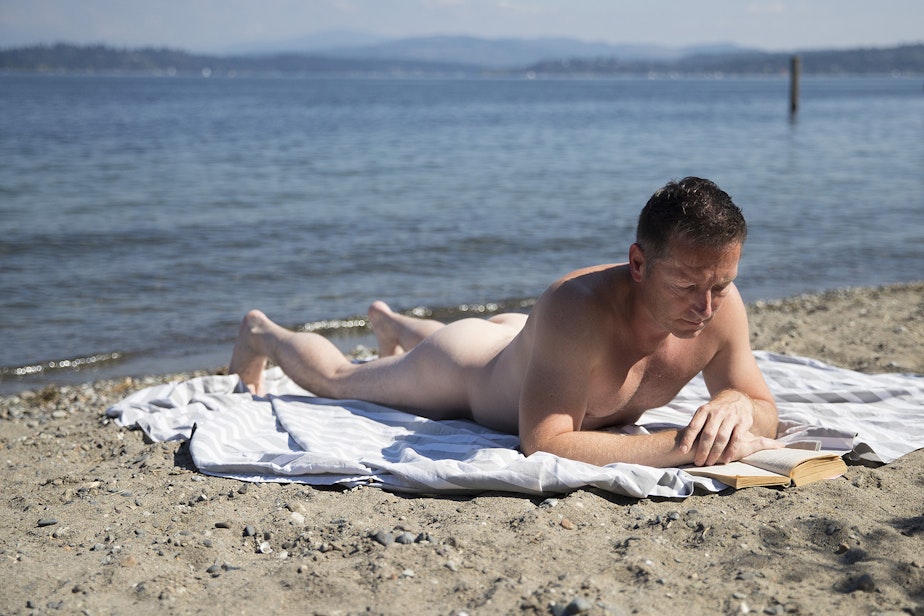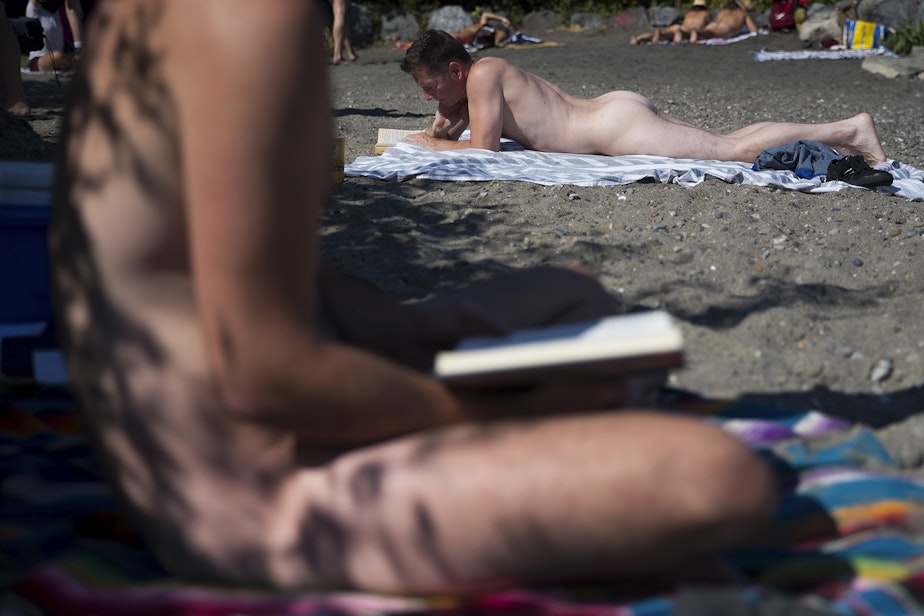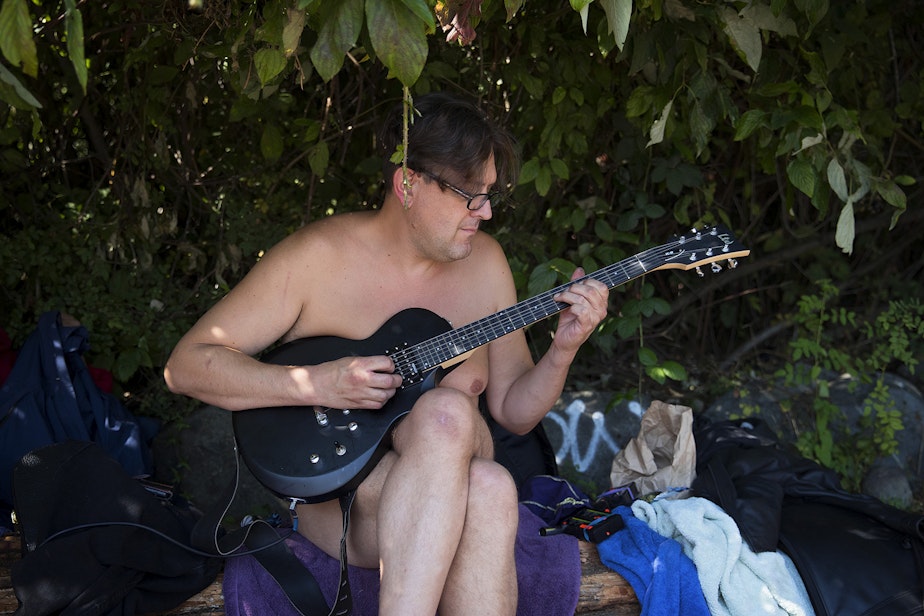It's legal to be naked (anywhere) in Seattle

Nudity was made legal here in the case of Seattle v. Johnson. Yes, really
Little known Seattle factoid: City law allows you to be nude anywhere, any time.
Not, however, if you flaunt it and make others uncomfortable. (Flashers, be warned.)
Despite this free range law, nudists stick to pockets of the city where others openly express their nudity.
One recent warm afternoon, about a dozen naked people relaxed on the lawn at Howell Park on the shores of Lake Washington. Most of the sunbathers were men, laying on blankets or towels reading books, eating snacks, or resting with their eyes closed.
The tiny park, known as Hidden Beach to longtime locals in the Madrona neighborhood, is surrounded by tall bushes that hide it from the road.
To clothed Dave Warnock, however, this was his grandma’s beach, the place she took him on his visits in the 1990s.
He and Grandma picked blackberries from the overgrown bushes and played in the rocks. Grandma swam out a few hundred feet for exercise. Here, Warnock overcame his fear of water.

“I used to be scared of the water when I was a little kid,” he said. “I stayed in the very shallows and every so often would go a little deeper and deeper until I finally learned how to swim.”
The norm was to visit the beach with clothes – but every so often a topless woman would appear, Warnock said, and Grandma hiked up the steep path home to call police.
Grandma would not abide the nudity—no matter that she was an ardent feminist and civil rights activist. But she moved out of the neighborhood in 2001, and since then (whether by coincidence or causation) the small enclave is now overwhelmingly naked and gay. Warnock asked KUOW, how did this beach become a haven for nudity?
Today the park is known as a safe and welcoming place for all bodies and sexualities, with or without clothing.
And on this particular afternoon, boyfriends Elias Darling and Will Flannery walked down the path to the beach with their friend Emily Lipton. They said they come often for the mellow, accepting atmosphere.
“Once you get naked, it kind of strips away all your walls,” Flannery said.
“You just feel comfortable, like there's no social expectations to even talk to people,” Lipton said. “You're kind of alone, but with people.”
They carried blankets, sunscreen, and a picnic of salad, cheese, chicken strips and ranch dressing.
Devotees of this beach are legion, and they are protective of this small oasis.

Aaron Justice McCartney said it’s where old friends meet, strangers share food, and violin music will be played impromptu.
"It, to me, reminds me there are special spaces where benevolence and camaraderie still exist,” McCartney said.
The reputation is traveling by word of mouth; new beach-goers are showing up.
Like so many places in this region, it’s more crowded, especially on weekends.
“You'll lay out your towel and then you'll be kind of worried your feet are going to hit someone else,” Darling said.
How could a nude beach flourish in the city? In fact, Seattle wasn’t always so permissive of public nudity. At one time, simply exposing genitals or female breasts was against city law.
In 1988, in an article titled “The Cops and The Tops,” the Seattle Weekly reported that police were citing nude sunbathers at Denny-Blaine beach for “lewd conduct” for the second year in a row. “For many women, it’s a matter of pride, and of gender politics, so they have continued to swim shirtless despite the tickets and the police patrols,” the article says.
The article described Howell Park, where Warnock used to visit as “a quieter, more family-oriented slice of lawn.”
In August, 1988, an anonymous writer to the Seattle Gay News submitted a letter to the editor in support of topless self-expression at Denny-Blaine Beach.
“There is a beach here in Seattle where many Lesbians gather regularly – to be ‘out,’ to be comfortable … just to be,” it read. “Straight men come in droves – they line the wall, they zoom in on boats, they come dressed up in police suits and give out tickets for ‘lewd conduct’ because some of us don’t wear shirts.”
The 1980s tested the city’s lewd conduct to the limit. The city was forced to pay a $110,000 judgment to a couple that skinny dipped at Madison Beach in 1982, got arrested, and then sued. (According to the Seattle Weekly, the Seattle Police Department kept their clothes as evidence.)
Finally, in 1990, a state appellate judge ruled the city’s lewd conduct law violated First Amendment rights to freedom of expression in a case titled Seattle vs. Johnson. (Yes, really.)
Four years later, the Seattle City Council finally repealed the law.
State law still prohibits crimes of indecent exposure. Seattle didn’t have its own indecent exposure law until 2013 when the city sought to harmonize its criminal code with state law.
Under municipal code now, prosecutors must prove a naked person knows “that such conduct is likely to cause reasonable affront or alarm.”
“That’s why our office might prosecute a flasher, but not a Fremont Solstice naked bike rider,” said Seattle City Attorney spokesperson Dan Nolte. “As we do any time SPD makes an arrest, we review the facts and circumstances of the incident in determining whether to file charges.”
Seattle police spokesman Sean Whitcomb said using nudity to harm others, especially minors – no go.
But, he added, “being naked is okay. Being partially naked is okay. Going to a nude beach, participating in a parade, swimming naked — no big deal.”




